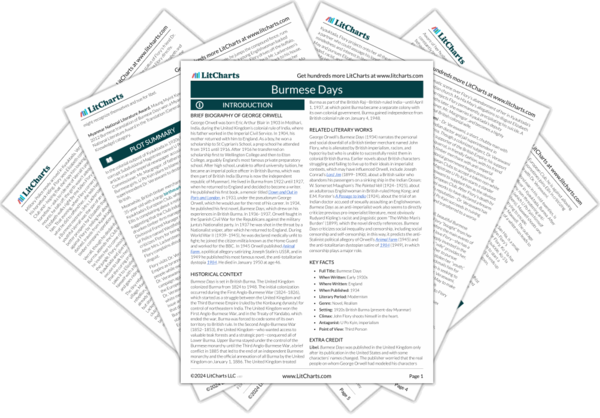George Orwell was born Eric Arthur Blair in 1903 in Motihari, India, during the United Kingdom’s colonial rule of India, where his father worked in the Imperial Civil Service. In 1904, his mother returned with him to England. As a boy, he won a scholarship to St Cyprian’s School, a prep school he attended from 1911 until 1916. After 1916 he transferred on scholarship first to Wellington College and then to Eton College, arguably England’s most famous private preparatory school. After high school, unable to afford university tuition, he became an imperial police officer in British Burma, which was then part of British India (Burma is now the independent republic of Myanmar). He lived in Burma from 1922 until 1927, when he returned to England and decided to become a writer. He published his first book, a memoir titled
Down and Out in Paris and London, in 1933, under the pseudonym George Orwell, which he would use for the rest of his career. In 1934, he published his first novel,
Burmese Days, which drew on his experiences in British Burma. In 1936–1937, Orwell fought in the Spanish Civil War for the Republicans against the military junta’s Nationalist party. In 1937 he was shot in the throat by a Nationalist sniper, after which he returned to England. During World War II (1939–1945), he was declared medically unfit to fight; he joined the citizen militia known as the Home Guard and worked for the BBC. In 1945 Orwell published
Animal Farm, a political allegory satirizing Joseph Stalin’s USSR, and in 1949 he published his most famous novel, the anti-totalitarian dystopia
1984. He died in January 1950 at age 46.
